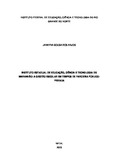Instituto Estadual de Educação, Ciência e Tecnologia do Maranhão : a gestão escolar em tempos de parceria público-privada

Visualizar/
Data
2023-09-14Autor
Anjos, Janayna Sousa dos
http://lattes.cnpq.br/9957341460044619
Metadado
Mostrar registro completoResumo
The present dissertation aims to analyze the conception of school management
substantiated in the institutional documents that guide the functioning of IEMA, in the
context of a public-private partnership. The research adopts the dialectical method and
a qualitative approach, supported by bibliographical and documentary research. The
consulted documents include the Foundational Charter, the Institutional Development
Plan, the Institutional Pedagogical Proposal, the General Regulations of IEMA, the
Operational Guidelines, and the Educational Management Technology (TGE)
Handbook. The knowledge gap regarding the subject in question lies in the scarcity of
investigations that deepen the analysis of the guidelines, principles, and values present
in the institutional instruments of IEMA, aiming to identify business influences and
dynamics arising from the public-private partnership in this specific context. Through
this documentary approach, we aim for this study to stimulate reflections on the
ramifications resulting from these elements in school management and the
comprehensive education of students, thus contributing to a more comprehensive
understanding of the functioning of IEMA. The results reveal that school management
is a product and synthesis of factors that have influenced its transformation throughout
history; the school management model adopted by IEMA, known as TGE, incorporates
business values that distort the notion of emancipation in public and free education;
the partnership with the Institute of Co-responsibility for Education (ICE) prioritizes
meritocracy and increased productivity, at the expense of the comprehensive
education of students; the pedagogical approach of IEMA focuses on learning to learn,
diminishing the value of school content and the role of the teacher, placing more
emphasis on the competencies and skills necessary for the labor market. The school
management outlined in the institutional documents that guide the functioning of IEMA
is oriented by democratic principles, comprehensive education, and community
participation; however, this approach faces contradictions due to the influence of
business values and the public-private partnership, which can compromise the full
realization of democratic principles and a critical vision of education.



